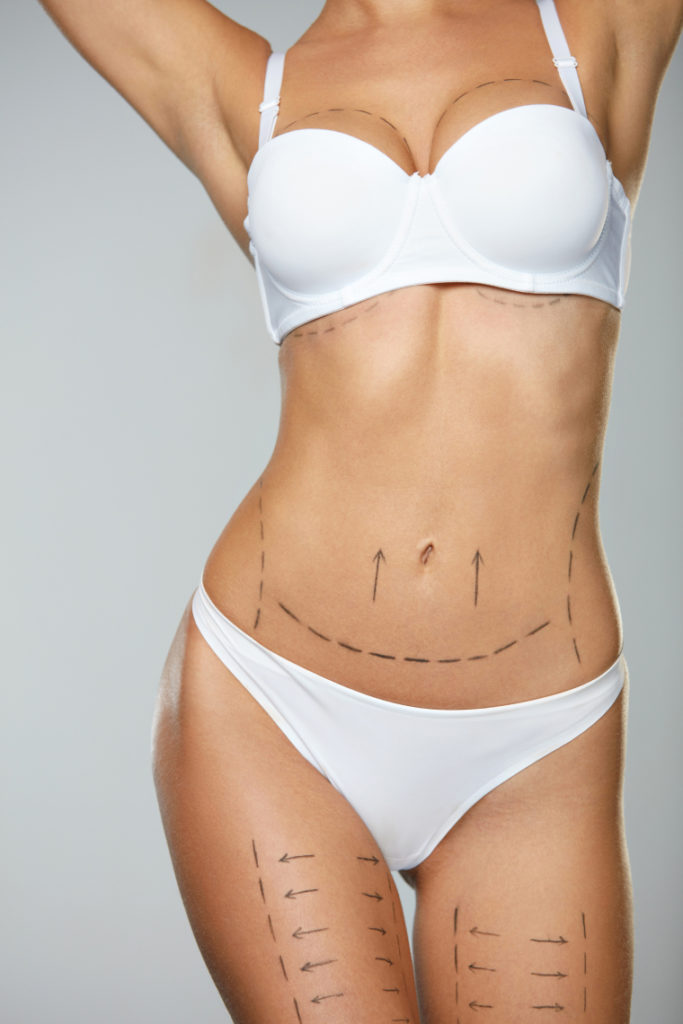
Are They All You Dreamed They Would Be?
In the days and weeks right after your surgery, your breasts will be quite firm and will sit high up on your chest. Don’t worry. They will soften up and will drop. Remember, the breast on your dominant side (your right side, if you are right-handed) may not drop as fast as the breast on your non-dominant side. In the weeks and months following your breast augmentation procedure, your breasts may appear “off” in shape or position. They also may feel itchy or sensitive. This is because your skin has been stretched over the implants, making your breasts very firm and high. The full results of your breast augmentation won’t be seen completely for many weeks, so be patient.
Drains after Your Breast Augmentation Recovery
Your surgeon may have placed one or more drains in your incision to remove excess fluid. (The fluid may be pinkish or brownish.) These thin plastic tubes may be left in place overnight after surgery. There may be a little irritation around the edges of the incision due to the drain
Caring for Breast Implant Incisions
After the surgery the surgeon will place waterproof plasters over your incision sites. Keep your incisions/suture line dry. If the plaster should get wet or start to peel off we recommend that you contact the PPSI office to make an appointment to have the wounds cleaned and redressed.
It is important not to sweat into the incision while it is healing. Therefore curtail activity and sun tanning until after the incision is healed and sealed. Don’t over-do activity, especially of the upper body, too early. Let your body rest and heal. You want to minimize swelling around the implant. Do not get your incision wet between the time of your surgery and until the stitches have been removed.
Scars
All breast augmentation techniques will leave a permanent scar behind, which is meant to be as inconspicuous as possible after healing. Though uncommon, extensive scarring is a possible complication of breast augmentation. Remember that your scars will get worse before they get better. Your incision will heal, but scars go through a series of changes before they are completely healed and that can take months. Scarring is the result of the body’s attempt to heal the site of a cut, burn, or other wound. When the body heals from injury it produces an overabundance of collagen, which forms a scar. This production of collagen is kept in check by an enzyme aptly named collagenase that melts collagen away. During the initial healing process the interaction of these substances determine the nature and extent of scarring. Avoid direct sunlight.
Your scars will continue to refine. If they become raised, red or thickened, or appear to widen, contact your Doctor. Early intervention is important to achieving well-healed scars. Scars are generally refined to fine incision lines one year after surgery.
Bathing
You will be able to shower but not swim until your incisions are closed and your sutures have been removed.
Tip: You may not be able to wash your hair for a week because you should not raise your hands over your head. Wash your hair the night before your surgery and braid it or place it in a ponytail.
Loss of Sensitivity
You may lose some sensitivity in the nipple or the surrounding skin after breast augmentation surgery. This usually subsides within a few weeks. In rare cases, however, loss of sensation can be permanent. As sensation returns to your nipples and breasts, you may experience sharp pains, itching, heat, tingling and prickling. These temporary sensations occur because nerve function is returning.
Nipple Over Sensitivity
Many women complain of very erect and sensitive nipples after breast implant surgery. You can protect your nipples by using a Band-Aid (especially the large round ones), large corn pads, or nursing pads. These pads will protect your overly sensitive nipples from the abrasiveness of your clothing and shield your erect nipples.
Breast Noises: Squeaks and Gurgles
Do not be alarmed if you hear gurgling, buzzing, or crackling noises coming from your augmented breasts.
These noises may result from fluid build-up or air bubbles within the implant pocket. They can also be heard when the implant has not settled. This will likely pass in a few weeks.